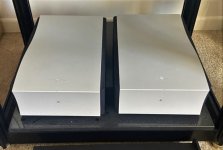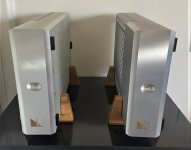Agreed. NO POLITICS!!!
Sent from my iPhone using Tapatalk Pro
Sent from my iPhone using Tapatalk Pro
I am in the camp of every amp sounds different.
My whole point was in response to your statement - "Its the market that is slowly choking out class A amps, not anything else. "
My poll at AG showed that the market for Class A still seems as strong as it ever was and it's now 5 pages long with only a small handful talking about Class D.


I ordered a pair of the Atma-Sphere Class D amps. Meeting my criteria of light weight amps (~15 pounds each) Voiced by the OTL tube amp maven himself. Balanced, also a criteria for me. - coming in January I hope.
Interesting, the Boulder gear I am looking at, the 812, has an SMPS in it. As does the Boulder 508 Phono Amp I already own.
So, the Class D amps will have linear power supplies, but the DAC/Pre + Phono will have SMPS - go figure.
At least I will be able to lift/carry all of it without hurting my back...
Alpha Audio's shoot-out posted today with Pass Labs vs DIY Class-D. IMO, the subjective tests were even-handed with little bias or ego getting in the way.
